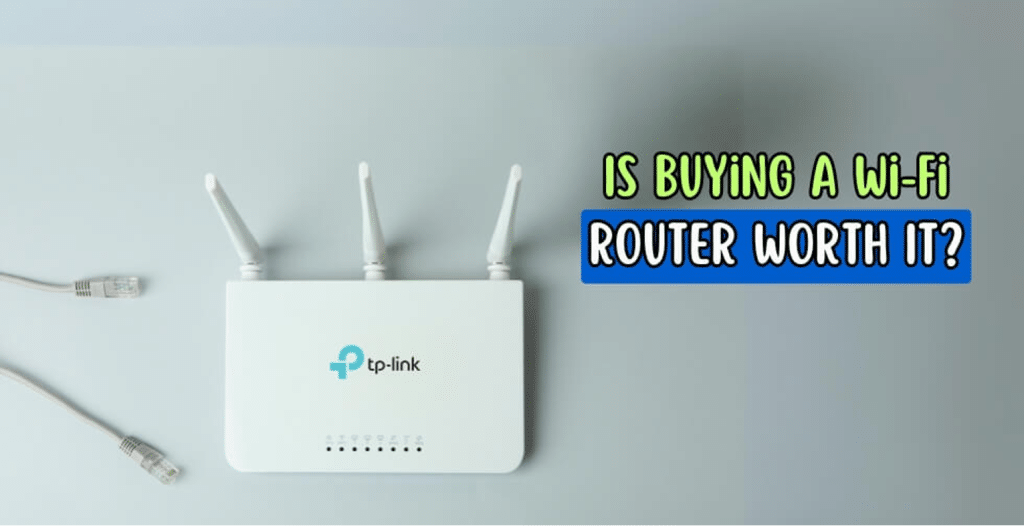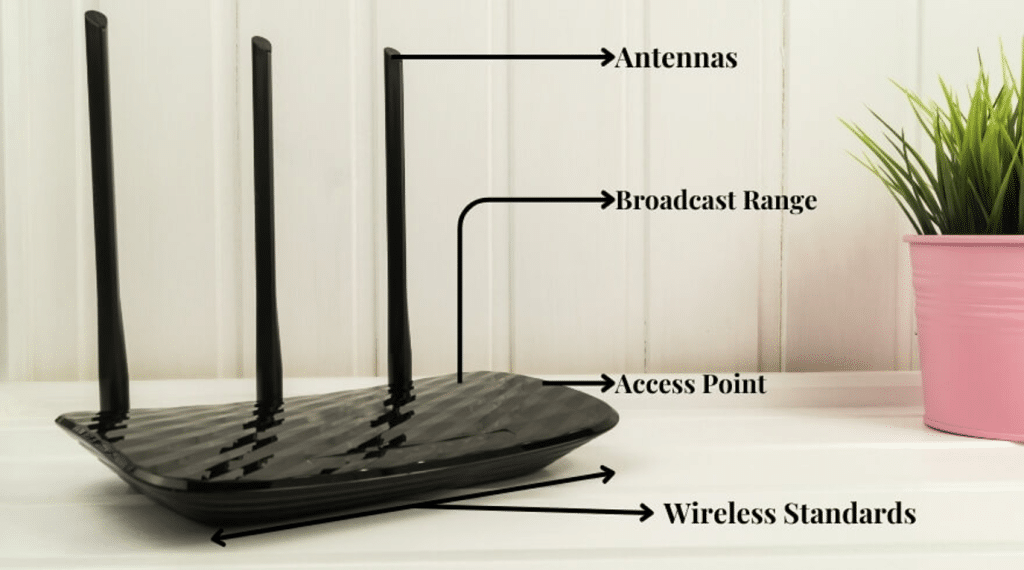These days, Wi-Fi routers are an essential part of maintaining a stable and secure internet connection. With so many devices depending on Wi-Fi, it’s natural to wonder about the value of investing in your router. This is where a question arises, “Is buying a wifi router worth it?”
Yes, buying a Wi-Fi router is indeed worth it. It offers plenty of advantages, such as faster internet speeds, better security, and greater coverage. Moreover, owning your router can save long-term costs by avoiding monthly rental fees. These benefits make investing in a Wi-Fi router a smart choice for most households.
Still curious about the advantages of owning a Wi-Fi router? This article provides all the information you need to understand why buying a router is a worthwhile investment for your home or office. Take a closer look at the content to discover the full benefits.
How Do You Determine if You Need a New Wi-Fi Router?
We live in a digital generation where staying connected is more important than ever. A reliable internet connection enhances daily work, communication, and entertainment activities. Identifying your specific needs can help you choose the right Wi-Fi setup. There are several factors to consider, which will be discussed further.
Analyze Your Internet Usage
Knowing your internet usage is crucial to determining whether you need a Wi-Fi router. If you regularly stream videos, play online games, or conduct video calls, a router can provide a stable and fast connection. High internet demands require more powerful hardware to ensure smooth performance, making it essential to understand how you use the internet daily.
Review Your Current Internet Connection
Take a close look at your current internet connection setup. If you are using mobile data or public Wi-Fi, you may face security risks and slower speeds. A personal Wi-Fi router can offer a safer and more reliable connection, improving your overall online experience. This improvement can be significant for sensitive activities like online shopping or banking.
Consider Your Home Size and Layout
Your Wi-Fi needs are significantly influenced by your home’s size and layout. Larger homes often have areas where the signal may be weak or non-existent, leading to frustrating internet experiences. A dedicated Wi-Fi router can provide better coverage, ensuring that you can connect from any room. Investing in a good router can eliminate dead zones and improve connectivity throughout your space.
Think About the Number of Devices
Count how many devices connect to your network. Almost everyone in today’s household has a smartphone, laptop, tablet, or smart device that requires internet access. Using a reliable Wi-Fi router, multiple connections can be managed efficiently without affecting speed. Ensuring that your router can support all your devices will lead to a better online experience for everyone in your home.
Comparing Cost versus Benefits
You should consider the cost of purchasing a Wi-Fi router against the potential benefits. While some may hesitate to spend money on new equipment, the advantages of improved speed, coverage, and security can be well worth the investment. A good router can significantly improve your internet usage, making it a valuable addition to your home.
Determining if you need a Wi-Fi router involves various factors, such as usage patterns, home layout, and the number of connected devices. Taking these into account will help you make a more informed decision about your internet needs.
Is Buying a Wifi Router Worth It?
A stable and secure internet connection is essential in our technologically advanced world. Investing in a Wi-Fi router can bring numerous benefits, such as improving your online experience. You can make an informed decision if you understand these advantages. Here are a few key benefits to consider.

Improved Internet Speed
One of the primary benefits of owning a Wi-Fi router is the ability to enjoy faster internet speeds. A quality router can optimize your internet connection, reducing lag and buffering. This is particularly beneficial for streaming, gaming, and other high-bandwidth activities, making your online experience smoother and more enjoyable.
Improved Network Security
A Wi-Fi router provides improved security features that protect your network from potential threats. With built-in firewalls and advanced encryption protocols, a router helps protect your personal information from hackers. This added layer of security is essential for anyone concerned about privacy and data protection.
Greater Coverage and Connectivity
Investing in a Wi-Fi router can significantly expand the coverage of your internet connection. Modern routers are designed to cover larger areas, ensuring strong signals throughout your home or office. This means you can stay connected from any room without experiencing weak signals or dead zones.
Customization and Control
Owning a Wi-Fi router gives you greater control over your network. You can customize settings to prioritize certain devices, set up parental controls, and manage who has access to your network. This level of control allows you to tailor your internet experience to meet your specific needs.
Long-Term Cost Savings
While the first investment in a Wi-Fi router may seem significant, it can lead to long-term savings. Owning your router means you avoid monthly rental fees from your internet service provider. Over time, these savings can add up, making a router a cost-effective choice.
Future-Proofing Your Network
A modern Wi-Fi router ensures that your network is ready for technological advances in the future. As internet speeds increase and more devices become connected, a good router can handle these demands, providing a future-proof solution that keeps your network up to date.
Buying a Wi-Fi router offers numerous benefits, from faster speeds to enhanced security and better coverage. Considering these advantages can help you make an informed decision about whether investing in a router is the right choice for your needs.
What Are the Best Places to Buy Wifi Routers?
If you need a reliable internet connection for work, gaming, or streaming, choosing the right router can make all the difference. To find the best deals and the most reliable options, you need to know where to look. Here are some tips to help you:
Online Retailers
There are many Wi-Fi router models available online from different brands, making it easy to compare features and prices. Platforms like Buymode often provide user reviews, which can be helpful when you want to buy Wifi routers online at the best prices. Additionally, shopping through these retailers offers the convenience of home delivery, sometimes with free shipping options.
Electronics Stores
Wi-Fi routers can be found in various electronic stores. These stores offer the advantage of seeing the product in person before purchasing. Expert staff members are often available to guide you on which router might best meet your needs. Also, buying in-store allows for easy returns or exchanges if needed.
Manufacturer Websites
Purchasing directly from the manufacturer’s website, such as TP-Link, ensures that you’re getting an authentic product. Manufacturer websites often offer exclusive deals or bundles that aren’t available elsewhere. Additionally, buying directly from the source can make warranty claims or customer support more straightforward.
Office Supply Stores
Several office supply stores carry Wi-Fi routers for home offices and small businesses. These stores often stock reliable brands and models suitable for professional environments. Shopping at these locations allows you to pick up other office essentials simultaneously, making it a convenient one-stop shop.
Local Computer Shops
When it comes to supporting small businesses, local computer shops are a great option. These shops often carry a wide selection of Wi-Fi routers and can offer personalized service that larger retailers might not. Additionally, local shops might provide installation assistance or technical support, adding value to your purchase. Shopping locally also allows you to build a relationship with the store for future needs.
You should consider factors such as price, convenience, and customer support when choosing where to buy your Wi-Fi router. Each option offers distinct advantages, so it’s essential to choose what best suits your needs. Making an informed decision will ensure you get the most out of your purchase.
Common Misconceptions About Buying a Wifi Router
Many misconceptions occur when it comes to buying a Wi-Fi router. Knowing the truth behind these common beliefs can help you make more informed decisions. Here are some of the most common misconceptions:
- All routers provide the same speed: Not all routers deliver the same internet speed, even if they are from the same brand or price range.
- More expensive means better performance: A higher price doesn’t always guarantee better performance. Some affordable routers can meet your needs perfectly.
- Routers don’t need to be replaced often: Technology develops quickly, and holding onto an outdated router can limit your internet experience.
- Location of the router doesn’t matter: The placement of the router significantly impacts the quality and reach of your Wi-Fi signal throughout your home.
- All routers work with every internet provider: Some routers may not be fully compatible with every internet service provider, affecting their functionality.
- More antennas always mean a better signal: The number of antennas isn’t always indicative of a stronger or more reliable Wi-Fi signal.
- Security features aren’t necessary: Skipping security features can open your network to threats, making it important to choose a router with built-in protections.
Believing these misconceptions can lead to poor choices when buying a Wi-Fi router. You should rely on accurate information to get the best performance from your device and ensure a smooth internet experience.
What Features Should You Look for in a Wifi Router?
A smooth internet experience depends on selecting the right Wi-Fi router. The right features can significantly improve your connectivity and ensure a stable network. Knowing what to look for can make all the difference. Here are a few key features you should consider:

Dual-Band or Tri-Band Support
With dual-band and tri-band routers, you can reduce signal interruptions and improve overall performance. With dual-band, you get a 2.4 GHz band for a longer range and a 5 GHz band for faster speeds. Tri-band routers add another 5 GHz band, further improving performance, especially in busy households with many devices.
Quality of Service (QoS)
You can prioritize certain types of traffic on your network using Quality of Service (QoS). This is useful if you have multiple users or devices that need consistent bandwidth, such as during video streaming or online gaming. With QoS, you can ensure that critical activities get the bandwidth they need, reducing lag and buffering.
MU-MIMO Technology
A router can communicate with multiple devices continuously using MU-MIMO (Multi-User, Multiple-Input, Multiple-Output) technology. This feature is essential in homes where many devices are connected at once. MU-MIMO helps in distributing the available bandwidth more efficiently, ensuring a smoother and faster internet experience for all connected devices.
Easy Setup and Management
User-friendly setup and management interface are important features to consider. Routers with easy setup allow you to get your network up and running quickly, even if you’re not tech-savvy. Look for routers with companion apps or web-based interfaces that simplify the process of managing your network, such as setting up guest networks or parental controls.
Range Extending Capabilities
Some routers come with built-in features that extend the range of your Wi-Fi signal. This is particularly useful for larger homes or offices where signal strength may weaken at a distance. Features like beam forming technology can help direct the Wi-Fi signal more efficiently to your devices, improving coverage and reducing dead zones.
You can ensure optimal network performance by choosing the right Wi-Fi router. By focusing on what matters most to you, such as performance, ease of use, and coverage, you can find a router that meets your needs and improves your internet experience.
Frequently Asked Questions
When considering the purchase of a Wi-Fi router, many questions come to mind. You can clarify whether buying your own router is the right choice for you by understanding its benefits and value. Here are some frequently asked questions about the topic:
What Are the Environmental Benefits of Owning a Wi-Fi Router?
By reducing electronic waste, Wi-Fi routers can contribute to environmental sustainability. When you own your router, you’re less likely to replace it frequently compared to renting it from an ISP. This helps in minimizing the waste of electronic devices, which can have a significant environmental impact.
How Does Owning a Wi-Fi Router Affect Your Privacy?
If you own your Wi-Fi router, you can control privacy settings, which can reduce the risk of unauthorized access to your personal information. You can manage security protocols directly and ensure that only trusted devices are connected, thereby increasing your overall data privacy.
Are There Customization Options When You Own a Wi-Fi Router?
Yes, owning a Wi-Fi router allows for greater customization. You can adjust settings such as bandwidth usage, parental controls, and guest networks to suit your specific needs. This flexibility is often limited when using an ISP router, making ownership more advantageous.
Can Owning a Wi-Fi Router Improve Your Internet During Power Outages?
Certain Wi-Fi routers are compatible with backup power options, such as Uninterruptible Power Supplies (UPS). Owning a router that supports these options can keep your network running during power outages, ensuring uninterrupted internet access for essential tasks or communication.
How Does Owning a Wi-Fi Router Affect Firmware Updates?
When you own your Wi-Fi router, you are in control of firmware updates, which are crucial for maintaining security and performance. You can ensure your router is always up to date with the latest features and protections, something that may be less consistent with rented routers.
Final Word
Investing in your own Wi-Fi router provides numerous advantages, from environmental benefits to enhanced privacy and customization options. By owning a router, you gain control over your internet experience, making it more secure and specific to your needs. Given these benefits, the answer to “Is buying a wifi router worth it?” is a definite yes.
To make the most of your investment, consider choosing a router that offers features suited to your specific needs, such as backup power compatibility and easy-to-manage firmware updates. With these tips in mind, you can enjoy a more reliable and personalized internet experience. Best wishes as you upgrade your home network!
